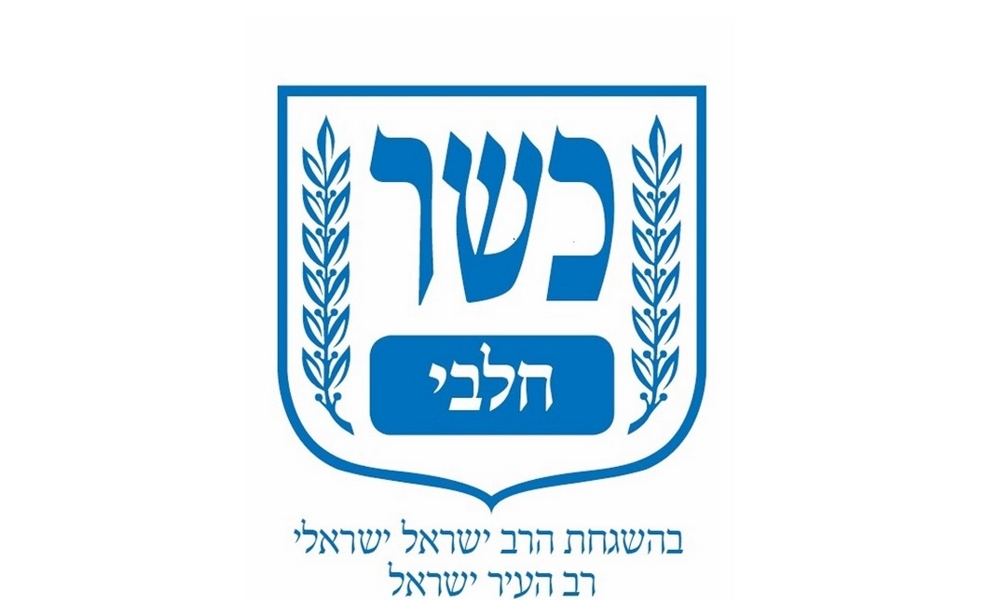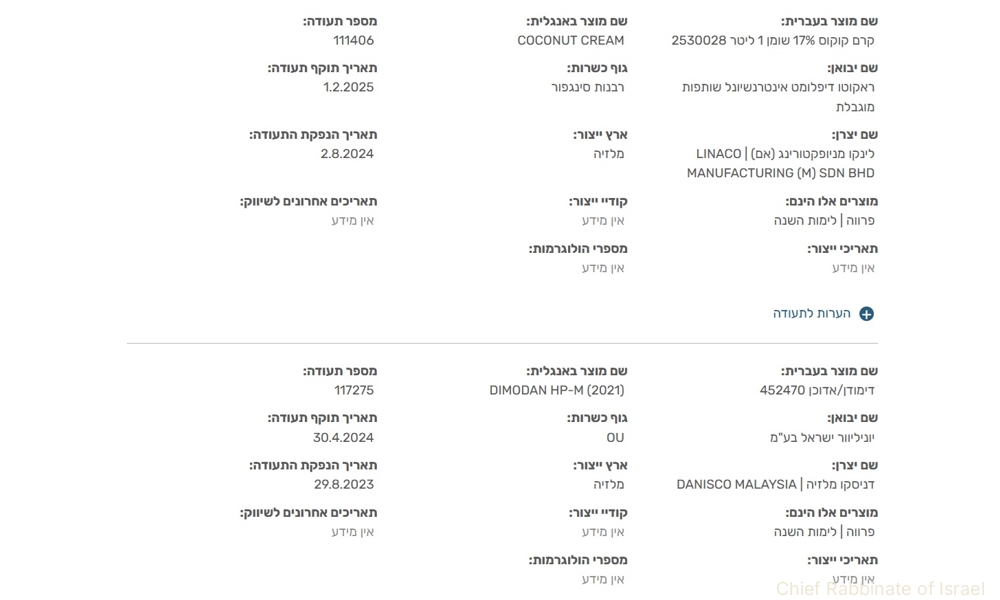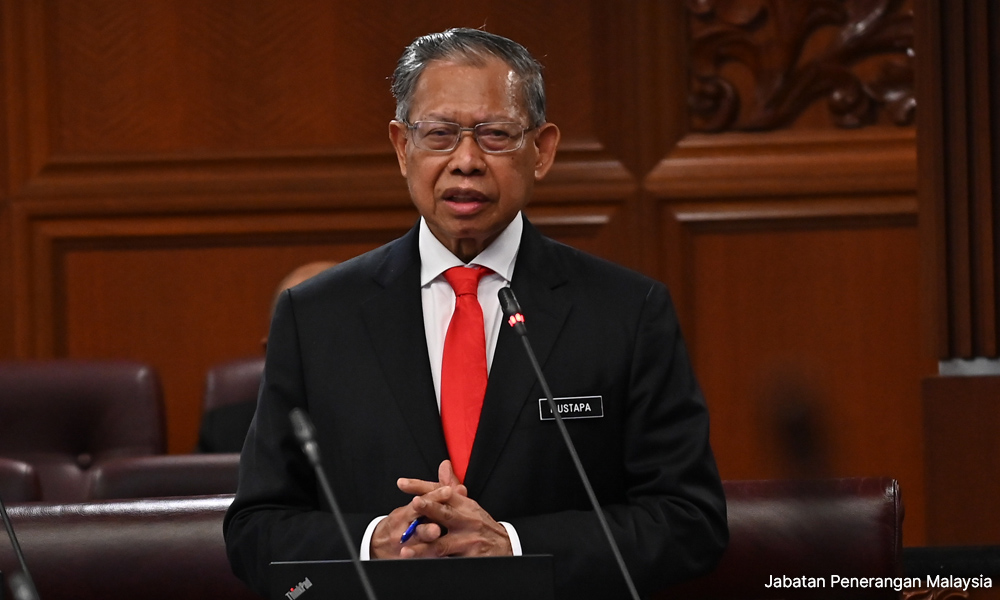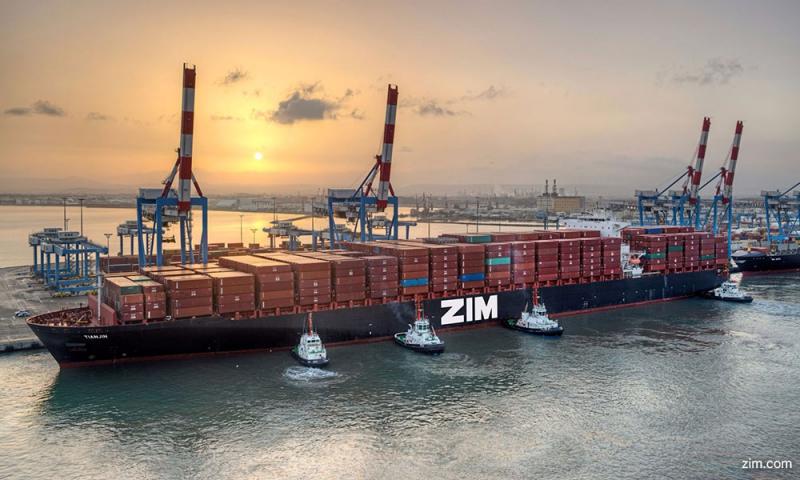UPDATED 4.25PM | July 5, 2024 | Added Aik Cheong's response to the article
UPDATED 4.44PM | Added Linaco’s response to article.
Official Israeli data show that dozens of food products from companies in Malaysia have reached importers in Israel for sale in the local market or as ingredients in food manufacturing there.
This is despite a staunch anti-Israel diplomatic stance, including a trade sanction by Malaysia, especially amid the ongoing violence in Gaza which erupted on Oct 7 last year.
However, some Malaysian manufacturers who responded to requests for comment denied they exported goods to Israel and did not know their products were listed on the Israel database.
The Israeli data indicate that some of these products have licensing certificates dated during the ongoing war that Israel is waging in the Gaza Strip.
The official data, obtained and examined by the Arabic Post, were issued by the “Chief Rabbinate of Israel”, the country’s religious authority which issues kosher certificates necessary for marketing and selling products in Israel.
The kosher certificate means that the food product and raw materials comply with Jewish dietary rules, and the certificate’s logo is placed on products sold in Israel.

This is akin to the halal certificates issued by the Department of Islamic Development Malaysia (Jakim) and halal authorities in other countries.
The Arabic Post only examined the data published on an Israeli government website from Oct 7, 2023 to May 30, 2024.
This means there are more products which obtained the kosher certification before this, while the database continues to be updated with new products that have been awarded the certification.
Who are the Malaysian manufacturers?
According to the data, 36 products from factories based in Malaysia received the kosher certificate, and all these products are food items, including food flavourings, oil, cocoa and cream.
The data shows the products were manufactured in Malaysia and imported by an Israeli company.
However, it is unclear if the importers dealt directly with the Malaysian firms or went through third-party agents.
The 36 products were produced by 12 factories in Malaysia, with many of them subsidiaries of larger international companies.
One notable Malaysian firm selling its items in Israel is coffee manufacturer, Aik Cheong Sdn Bhd.
Two of its products - Golden Eagle instant coffee drink and a powdered ingredient to make cappuccino - received kosher certification from the Chief Rabbinate of Israel since Oct 7.
KLK Oleo Sdn Bhd, a subsidiary of the public-listed palm oil giant Kuala Lumpur Kepong Bhd, is also listed as the manufacturer of palm oil products imported by Israeli firms, the Israeli database shows.
Others include the brand owner of the Rasaku brand of coconut cream, Linaco Manufacturing (M) Sdn Bhd, and other manufacturers which are subsidiaries of global manufacturing companies headquartered in Japan, the United States and Europe.

The company listed as importing Linaco’s coconut cream is Rakuto Kasei Israel Ltd/Rakuto Diplomat International Ltd, which says it is “the biggest distribution and marketing company of consumer goods in Israel”.
In an immediate response, Linaco clarified the company had over the past year ceased direct exports to certain markets, aligning strictly with national trade policies and our commitment to ethical business practices.
”Our primary focus remains on expanding the reach of Malaysian products in the global marketplace.
“Linaco is dedicated to penetrating key international markets, such as the United States and Europe, including Islamic nations.
”This strategic approach not only fosters our company’s growth but also significantly contributes to Malaysia’s economic development and GDP enhancement,” said the company in a statement.
At the same time, the company said the kosher certification mentioned is one of several internationally recognised standards that Linaco adheres to.
Some firms deny exporting to Israeli market
Arabic Post and Malaysiakini have contacted the Malaysian companies listed in the Israeli government database.
At the time of publication, only Aik Cheong, Purecircle Sdn Bhd, and Danisco (M) Sdn Bhd responded. They deny exporting any goods to Israel. Mewaholeo Industries Sdn Bhd said it will respond via email.
Although Aik Cheong’s website and the kosher database state that the coffee maker’s name is Aik Cheong Sdn Bhd, this company does not exist on the Companies Commission of Malaysia website. Instead, Malaysiakini contacted Aik Cheong Beverages Sdn Bhd.
Aik Cheong Beverages Sdn Bhd’s administration manager and halal executive Nor Hafiqqie Mohd Nor said the company does not export its products to Israel and has no knowledge of the kosher certification.
“No Aik Cheong product has ever been exported to Israel,” he said, despite the Israeli kosher database stating otherwise.
In a statement to Malaysiakini on July 5, Aik Cheong Coffee Roaster Sdn Bhd said the products listed were products they made for a client based in Russia.
It said the products - Golden Eagle instant coffee drink and Powder for making a cappuccino coffee drink with cocoa crumbs - were exported directly to Russia.
According to Aik Cheong, it has clients from 50 different countries except Israel and the clients reserve their right to do business with any other country according to their own terms.
“However, we have advised our clients not to do business with certain countries that have been sanctioned by Malaysia.
“In regards to the kosher certificates, they were registered by distributors of our Russian client without informing us.
“Thus, we have ordered our clients in Russia to ask their distributors to cancel the certificates,” the company said.
Aik Cheong added that they support Palestine’s struggle for freedom and strongly oppose genocides.
Purecircle Sdn Bhd, a stevia product manufacturer that is part of US food additive maker Ingredion, said the same thing.
“We have never exported or imported any goods to or from Israel. If there is any listed (on the Israeli database) it would not be from our company in Malaysia.
“Malaysia does not have any trading relationship with Israel and we adhere to the laws,” said Purecircle Sdn Bhd customer manager Nicole Tang when contacted.
Danisco (M) Sdn Bhd logistics manager Hooi Hoe Ping also said Danisco Malaysia does not export any products to the Israeli market.
Danisco (M) Sdn Bhd is a subsidiary of the Danish food ingredients manufacturer by the same name, which was acquired by American chemical company DuPont in 2011.
Multi-million US dollar trade between Israel, Malaysia
The discovery of Malaysian food products imported by Israeli companies comes as the Malaysian government imposed a ban on Israeli cargo giant Zim from its shores.
The food products are also just part of the multimillion-dollar trade which occurred between Malaysia and Israel over the past decades, as recorded in United Nations statistics.
Israel’s imports from Malaysia peaked in 2018 at US$304 million (RM1.2 billion), while exports to Malaysia reached a high of USS$1.46 billion (RM4.6 billion) in 2013.
In 2014, then international trade and investment minister Mustapa Mohamed said the presence of Malaysian goods in Israel “cannot be helped” since Malaysia is part of the global supply chain of international manufacturers.
“These international trade and investment practices are beyond the control of the Malaysian government,” he said, following a public furore over Malaysia being the third largest trading partner to Israel in Southeast Asia at the time.
He added that Malaysian goods sent to Palestine also go through the Ashdod port in Israel to reach their final destination, and would be recorded as being exported to Israel.

Goods not for Palestine market
However, checks by Arabic Post found the 36 Malaysian products imported by Israeli companies were not for the Palestinian market.
This is because goods meant for Palestine do not require the kosher certificate, said Tarek Saqf Al-Hait, a trader and general assembly member of the Nablus Chamber of Commerce and Industry in the West Bank.
“(The kosher certificate is) not required; the licences issued by the Israeli Ministry of Health to the Palestinian importer state that they are for sale in Palestinian Authority areas, so the certificate or religious endorsement is not mandatory,” he said.
The Israeli data related to Malaysia are part of a larger database revealing the arrival of thousands of products from companies and factories based in Arab and Islamic countries to Israeli importers.
Among these countries are Tunisia, Saudi Arabia, Egypt, Jordan, Morocco, UAE, Turkiye, Indonesia and Pakistan.
Arabic Post found that 412 companies from the countries listed had exported goods to Israel, and whose goods were given the kosher certification for sale or use in Israel from Oct 7 to May 30.
Last month, BDS Malaysia, the local chapter of a global movement to boycott firms complicit with Israel, demanded the Malaysian government align its economic activities and diplomatic policies against Israel.
“Failure to do so will not only undermine our position but also weaken our solidarity,” it said in a statement.
Last Friday, Prime Minister Anwar Ibrahim said the government will “cancel cooperation with all Israeli companies operating from Israel” but cannot do the same for Israel-linked firms operating elsewhere because it could hurt the Malaysian economy.
“So, while I will staunchly advocate for and defend the Palestinian people, particularly in Gaza, I do not want to weaken our country’s economic strength. If a company is from Israel, I remain firm,” he said.
Additional reporting: Iqbal Harraz, Adib Faris and Siti Nur Shahirah.
Arabic Post is an independent news website providing in-depth coverage and investigative reporting on the Middle East and the wider region.





